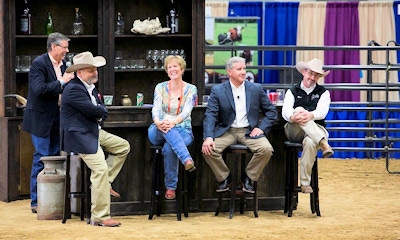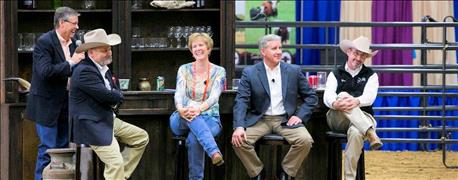March 1, 2016

Success in the beef industry hinges on an extensive list of factors – from genetics and animal health to consumer demand. But Tom Field, Director of the Engler Agribusiness Entrepreneurship Program at the University of Nebraska – Lincoln, points out that what ultimately will determine the future success of the industry is human capital. “If we don’t get enough people, nothing else matters,” Field says.
As the facilitator of a beef industry panel discussion held at the 2016 Cattle Industry Convention recently in San Diego, Calif., Field posed the question: What advice would you give young producers starting in the beef business?

Left to right Tom Field, Dave Daley, Patsy Houghton, Tom Brink and Don Shiefelbein held a panel discussion on the future of the beef industry during the 2016 Cattle Industry Convention in San Diego in late January. (Photo Courtesy NCBA)
The four panelists included David Daley, interim dean for the College of Agriculture at California State University in Chico; Patsy Houghton of Heartland Cattle Co. McCook, Neb.; Tom Brink, founder and owner of Top Dollar Angus Inc. and CEO of the Red Angus Association of American; and Don Schiefelbein of Schiefelbein Farms, Kimball, Minn. They provided the following advice:
Brink: “It’s cliché but true. Know your costs. Make sure you are at or below industry costs for your geography. Know those numbers cold. Our industry historically has not been good at that. The other thing is to create a value-added product. Shoot to produce a calf crop that will sell above the market. It’s not easy, but I think you can do both [curb costs and produce high quality]. If you want to be in this industry long term, those are important.”
He continues, “You may need to go find older ranchers to partner with and create opportunities by building relationships and partnerships with those folks; they have resources and wisdom to share. I see a number of people starting out that way.”
Schiefelbein: “Concentrate on marrying rich,” he jokes, adding, “I’ve seen more young people coming to our bull sale and getting into the business than we’ve seen in a long time. When I graduated high school in 1989, the message was “don’t go into ag.” Today, I think things look quite positive.”
He also emphasizes the continuing importance for the industry to remain consumer-focused,
Saying, “We need to always ask: Were these animals produced with the consumer in mind. If they aren’t, it doesn’t matter how many pounds they gain or their future fertility. If we don’t make a product that the consumer wants, nothing happens. We’ve got to keep that in perspective.”.
Houghton: “Have a passion for what you do, and take a ‘failure is not an option’ attitude. Be excited about what you do. There are lots of opportunities in this industry especially as fewer people join the industry. We have a growing world and people get hungry every day. It’s not an easy life but it’s a great life. It’s something you can be excited about and get involved with.”
Daley: “There are barriers to entry [getting started], but there are lots of reasons to be optimistic. You must be a risk taker and overcome failures along the way. Every College of Ag is growing their offering of majors. I wish our industry would spend more energy on young people. Australia and New Zealand have done a better job. They have a grass-share program and cow share program to help beginning producers in a structured way. We haven’t put enough energy there. Human capital is how we move this thing forward. It’s how we don’t become the sheep business.”
- Gordon writes from Whitewood, S.D.
You May Also Like




